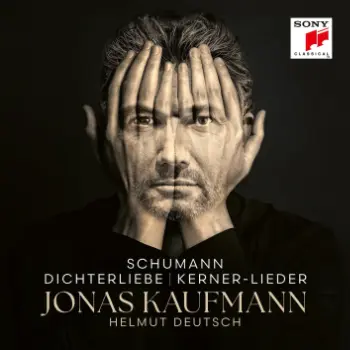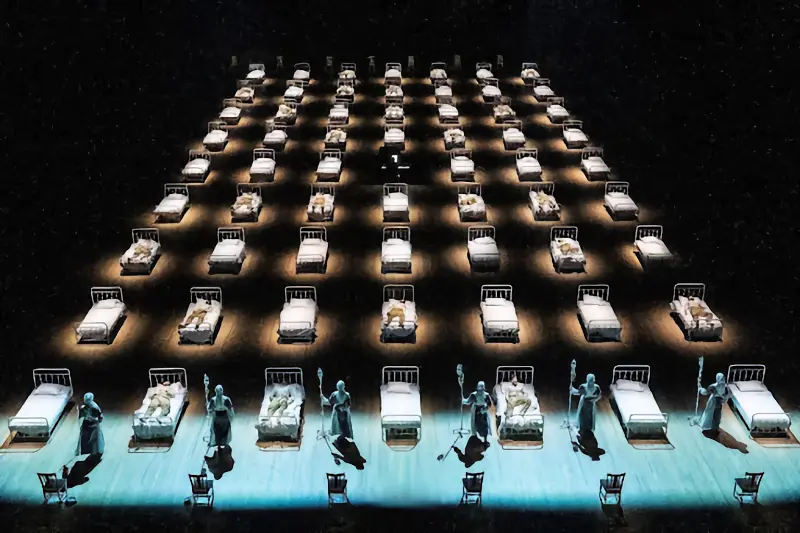These recordings of Jonas Kaufmann and Helmut Deutsch appear in several versions from Sony, rather confusingly. The CD release includes Schumann’s Dichterliebe and Kerner-Lieder, recorded during the Covid lockdown in 2020, together with a “bonus” of six tracks from Dichterliebe recorded in 1994 with pianist Jan Philip Schulz, from Kaufmann’s student years. The physical CD is accompanied by a DVD titled Doppelgänger, a staged performance of Schubert’s Schwanengesang, directed for the stage by Claus Guth.

Both Dichterliebe and Kerner-Lieder were written in 1840 during Schumann’s “Year of Song” (Liederjahr), which saw the creation of at least three other cycles. Although Dichterliebe remains the composer’s most famous set—and a prime example of the Romantic lied—the Kerner-Lieder should not be discounted for their artistic value.
In my writing on this duo’s previous album (reviewed here), I remarked on how the performers channeled their expressive capabilities to bring the texts to life. That proves vital here as well, given the descriptive and emotive nature of Heinrich Heine’s poems. That said, the opening song, while nuanced, does not convey enough of the longing and desire of which Heine writes. A comparative reading from Dietrich Fischer-Dieskau and Jorge Demus better evokes the yearning that Schumann builds into his phrasing.
Aus meinen Tränen sprießen (track 2) calls to mind a gentle nostalgia, though the tenor’s naturally husky voice, when coupled with consistently smooth phrasing, takes on a hint of weariness. Ian Bostridge’s version with Julius Drake brings greater vitality to the song, with more emphatic and varied contouring of the lines.
I began to suspect that this more restrained approach would dominate the rest of the cycle, but was fortunately proven wrong with Wenn ich in deine Augen seh (track 4). Although things begin quietly enough, Kaufmann finally breaks through in a pivotal moment when Heine describes love. Here the full range of his vocal capabilities emerges, encompassing a full-bodied passion with a well-rounded tone.
In Im Rhein, im heiligen Strome (track 6), determination and power take center stage. Here I wished that Deutsch might infuse a stronger presence into the piano part, which feels somewhat lukewarm alongside the tenor’s firm singing. The heroic Ich grolle nicht (track 7) sounds expansive, but could benefit from greater urgency to drive the momentum—something Fritz Wunderlich and Hubert Geisen achieve marvelously.
Other songs, such as Hör’ ich das Liedchen klingen (track 10), fare better, showing fine interplay of textures. While Kaufmann conveys a tangible melancholy, Deutsch creates a raindrop-like effect in his part—possibly a reflection of the narrator’s tears.
Kerner-Lieder may not be as thematically integrated a set as Dichterliebe, but given Schumann’s unparalleled skill in song writing, the result is a vibrantly multidimensional cycle. Kerner’s poems often center around the theme of slumber. While one might expect softer, slower portrayals, Schumann instead offers dramatic settings, giving Kaufmann opportunities to display his operatic strengths.
Kaufmann is somewhat overpowered by the piano at the start of Lust der Sturmnacht (track 17), but recovers in the effective interplay of major and minor, light and dark. The following Stirb’, Lieb’ und Freud’! (track 18) shifts the mood toward calm reflection while avoiding stasis; Kaufmann’s rich narration serves the text well.
One of the highlights of the album is Wanderung (track 23), where singer and pianist emphasize the galloping rhythms in their respective parts, creating an ebullient, adventurous spirit. Stille Tränen (track 26) proves striking for the contrast between the mood of the music and the meaning of the text.
The performances here do not necessarily surpass previous recordings by this duo. However, the album remains worth a dedicated listen: despite inconsistencies, what comes through most clearly is a sincere engagement with the poetry and an earnest enthusiasm for the music. — Azusa Ueno
Schwanengesang for the Stage
The DVD production of Doppelgänger stages Schubert’s Schwanengesang in the Park Avenue Armory, transformed by Claus Guth into a First World War hospital ward lined with beds and silent figures. One might expect such a setting to invite orchestration, but the cycle remains accompanied only by Deutsch on the piano, keeping the work firmly within the world of song rather than opera.
The scale of the staging contrasts sharply with the intimacy of the music, and the sound engineering adds another layer of tension: closely miked and weighted toward the bass, it initially feels mismatched with the vast hall shown on screen. Once adjusted, however, the combination of stark imagery, spare accompaniment, and Kaufmann’s physically charged performance yields a powerful meditation on memory and loss. — Tal Agam
Recommended Comparisons (Schumann)
Fischer-Dieskau, Demus | Bostridge, Drake | Wunderlich, Giesen | Gerhaher, Huber

Album Details |
|
|---|---|
| Album name | Dichterliebe and Kerner-Lieder |
| Label | Sony Classical |
| Catalogue No. | 19439781382 |
| Artists | Jonas Kaufmann, Helmut Deutsch |





















